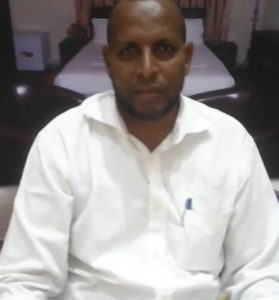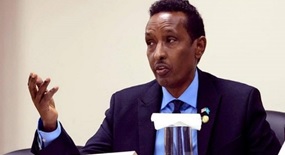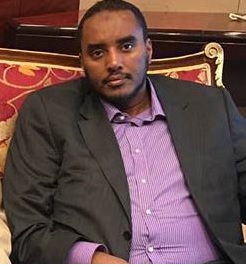By Hassan M. Abukar
Today’s Somali youth—and the generation that came of age after the 1991 civil war—are helping Mogadishu’s progress through hard work and building a network of social relationships that transcend parochial tribal affiliations.
A United Nations consultant from Buuhoodle in the northern Ayn Region of Somalia told me about his son’s visit with him in Mogadishu. The young man, who lives in North America, had not seen his father for years. The consultant was worried his son would be put off by Mogadishu’s security lapses and the lack of glittering entertainment venues for young people.
During his visit to Mogadishu, the son would borrow his father’s SUV and vanish into the city for hours. Concerned about his son’s regular forays into the city, his father asked him where on earth he spent his time there.
“Dad, I love Mogadishu. It’s a fun place to be,” the son said, “I have so many friends from social media to hang around with.”
“Okay, if that’s the case, then I have nothing to worry about, son.”

The father told me he was dumbfounded to learn how quickly and closely his son came to be connected with his Somali peers across the globe — far from his life in North America.
He explained his own initial surprise: “Hassan, I am out of touch,” he said, smiling. “I am a middle-aged man coming to terms with the fact that the world has morphed into a small village.”
This story illustrates a huge generational shift among Somali’s youth. They represent the best hope Mogadishu has of rebuilding itself after many years of civil war and anarchy. The generation that came after the 1991 civil war was spared from the atrocities and clannish enmities the country had experienced. While they may never have lived under a strong government in which law and order was the cornerstone of the administration, these young people desperately want a stable, united country.
Clannism is not a priority for them. In fact, their social relationships with diverse populations of Somalis are testimony to their commitment to marginalize tribalism. While Somalis in the diaspora are eager to know one’s clan, I was amazed to find that this generation of youngsters is not interested in clannism at all. To them, clan identity is not important. In Somalia, where the sudden mobilization of tribes can occur at any moment for any reason, it was uplifting and refreshing to see these young people flourishing in an environment bereft of clan talk.
I have seen it on social media; Somali youth from all walks of life are forming friendships and cementing a galaxy of networks via online platforms such as Facebook, Twitter, Instagram, and Snapchat. The experience of the UN consultant’s son clearly shows how this new generation feels at ease with friends across Somalia, especially in Mogadishu. Indeed, the Internet will continue to play a pivotal role in the rising prominence of the younger generation and the changes that are already in progress in Mogadishu.
Work ethic
Among the generational difference that attracted my attention was the work ethic of the youth who worked long hours six days a week. Despite high unemployment in the city, the young people I observed worked day in and day out, and gave me hope that the city was on the right track. These young people come from remote city neighborhoods to work tirelessly in low-paying jobs in restaurants, hotels, and office buildings, from early morning to near dusk.
Ali’s journey
Certainly, the younger generation is better placed to network with friends and meet up with each other than youngsters were a few decades ago.
Ali M. Hiraabe, a 45-year-old waiter/assistant manager at a restaurant in the capital proved to be a telling example of this change. After a few days of watching him interact with customers jovially and professionally, I asked him to tell me his story. He said that when the civil war broke out some 27 years ago, he was 18 and married with an infant.
Born in a rural area between Ceeldheer and Ceelbuur, Ali came to Mogadishu in 1983, and soon became smitten with the fast-paced urban environment. As he grew older, he studied religion and Arabic in various mosques and prepared for a career as a Quran teacher. He was teaching the Quran when the civil war erupted, found himself with no job and no place to stay.
“I was barely 18 with no job skills and a family to support,” he said.
He sent his wife and child to his hometown in Central Somalia so they could be safe. It was then that he made a career change, from a cleric to a day laborer. The war had destroyed many of the country’s institutions, making it difficult for many to find jobs. Ali decided to try his luck working in restaurants.
“People will always eat, even in the midst of war,” he said.

Ali applied for a restaurant job in the Kaaraan District. When asked if he had experience, he answered no, but that he was strong and reliable. The restaurant owner was impressed with his motivation and employed him as a waiter. However, there was a catch—Ali had to work for meals, not wages. The youngster accepted the offer, but made his own counteroffer: He asked if he could sleep in the restaurant at night. The owner agreed.
Ali rose early and made tea for the customers. He slowly learned how to cook and, within a month, he was promoted to a cashier; however, he still received no salary. The owner noticed Ali’s diligence and hard work and started trusting him. When the restaurant’s full-time waiter didn’t show up one day, Ali eagerly took his place. He became a waiter, cashier, and part-time cook — and earned his first pay of 10,000 Somali shillings.
After Ali had worked several months in the restaurant as a salaried employee, the owner decided to cut back costs and reduce his salary. Ali refused the cutback and walked away from the job.
The next day, Ali woke up early and approached an ice seller. He asked the man to hire him, promising to bring him more profits. He got the job and began learning new skills. The business expanded and started making more money.
“The owner and I were a team, and we really worked hard,” he said humbly. In fact, Ali said he made enough money to get his own place and buy a mattress and new clothes.
After several months, he fell out with the ice seller and moved on. Ali’s next stint was as a mechanic with UNICEF. This was followed by another job as a laborer in Saudi Arabia. One day, he suffered humiliation when a Saudi youngster spat in his face and shouted:
“You want to destroy our country like you did yours!”
Nevertheless, Ali remained in Saudi Arabia from 1997 until 2002. Then, he was caught in an immigration dragnet, detained for ten months, and deported back to Somalia.
Back in Mogadishu, Ali found jobs in successive restaurants. Despite the city’s security problems, he recalls once being robbed at gun point while he was working in a restaurant near the Howl-Wadaag District. Ali has been with his current job for over six years. He is a favorite with the customers because he is attentive, engaging, and has a self-deprecating sense of humor.
“Hard work and honesty have been my ingredients for survival in Mogadishu,” he told me. “I have no intention of going anywhere.”
Like many residents in the capital, Ali has now adapted to this new Mogadishu with its rapid growth, rebuilding, and periodic violent outbursts. His story personifies the ultimate goals of many in the city who hope to attain a stable, peaceful environment in which they can flourish and become better citizens.
As Ali said, “Mogadishu is not perfect, but it has its virtues.”
Epilogue
My five-part series, “Back to Mogadishu,” has generated positive feedback from many readers. Part III seemed to be the most widely read of the five. That was the first time I received numerous emails from friends and strangers, and all were positive and sympathetic.
Many people were dismayed that a few Somali government officials had acted in bad faith after they had offered me a job as a speech writer for President Farmajo, and later reneged on the offer after I had flown in to Mogadishu to take up the post.
My goal of writing Part III was not to shame anyone, including the Somali government. I wanted to share this experience with many of my friends, family members, and the public to explain how my efforts to serve my country came to naught when a few officials in Mogadishu felt insecure and threatened by my presence. I was not looking for a job when I was approached to be a speech writer for the Somali president — the job offer simply fell into my lap.
I wondered if the inability to fulfill a simple obligation (the promise of a job offer) is not indicative of incompetence on a much broader scale.
A few readers shared similar experiences, which removed the idea that my case was an anomaly.
Awad Calls

Foreign Minister Ahmed I. Awad had good intentions when he approached me about the speech-writing position. I knew from day one that the job was not within his purview—it was the responsibility of Villa Somalia, the seat of the Presidency, to hire a speech writer.
After the article was published, Awad called me from Djibouti, where he was on an official visit. He was not angry, but concerned, and apologized for what had happened to me in Mogadishu. He swore to me he did not see the email I had sent him while in Mogadishu.
“I am not someone who is disloyal and lets his friends down,” he said.
Villa Somalia Responds

On June 4, Awad called me again, and this time he was with Fahad Yasin, Chief of Staff of the Office of the Presidency. Awad asked me to talk to Fahad. In a calm voice, Fahad greeted me and told me he had heard about my botched meeting with officials in Villa Somalia.
“On behalf of the Office of the Presidency, I apologize for what has happened to you. It was not an evil intent on the part of the officials in Villa Somalia. They were overwhelmed with political crises,” he said. “We will pay all the expenses that you have incurred and any other loss you have sustained.”
Next, Awad spoke with me and underscored the importance of the apologies I had just received.
“Not many governments would admit a mistake and offer such an apology,” he said.
While I accepted Awad and Fahad’s apology, the ball is now in the court of the Somali government to do what is right. (Full disclosure: I am no longer interested in the job). So far, no compensation has yet been paid.
These two senior officials have taken the first of three steps to solve the problem.
As Stephen Covey wrote in his seminal book, The Seven Habits of Highly Effective People, “The proactive approach to a mistake is to acknowledge it instantly, correct and learn from it. This literally turns a failure into a success.”
Hassan M. Abukar
———–
Hassan M. Abukar is a contributor to Wardheernews and the author of Mogadishu Memoir. He can be reached at: [email protected].
———
Related Articles:
–Back to Mogadishu part iii thirty one years-later By Hassan Abukar
–Wardheernews person of the year- Somali youth: Generation tomorrow By WDN
We welcome the submission of all articles for possible publication on WardheerNews.com. WardheerNews will only consider articles sent exclusively. Please email your article today . Opinions expressed in this article are those of the author and do not necessarily reflect the views of WardheerNews.
WardheerNew’s tolerance platform is engaging with diversity of opinion, political ideology and self-expression. Tolerance is a necessary ingredient for creativity and civility.Tolerance fuels tenacity and audacity.
WardheerNews waxay tixgelin gaara siinaysaa maqaaladaha sida gaarka ah loogu soo diro ee aan lagu daabicin goobo kale. Maqaalkani wuxuu ka turjumayaa aragtida Qoraaga loomana fasiran karo tan WardheerNews.
Copyright © 2024 WardheerNews, All rights reserved


